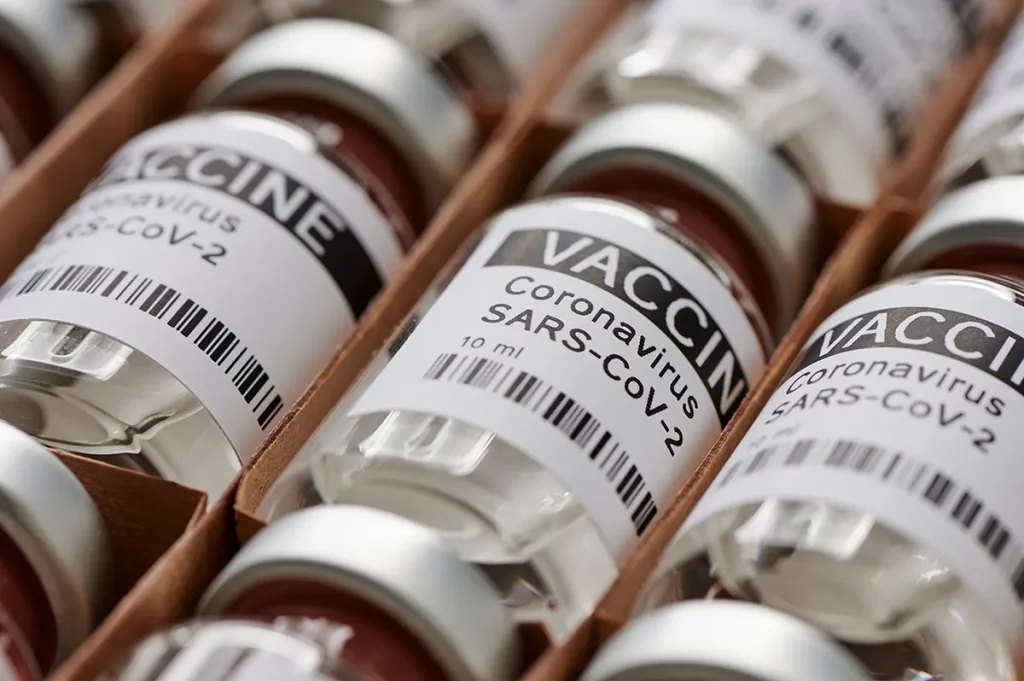COVID-19 Vaccines Now Available

The following information is from cdc.gov. Find out more by visiting their website here.
What You Need to Know
- A COVID-19 vaccine can help your body develop immunity to the virus, which can prevent you from getting sick or lessen the symptoms of sickness.
- Each vaccine works differently to provide your body with protection.
- You cannot contract the virus as a result of receiving the vaccine.
- Before a new vaccine is made publicly available, it undergoes extensive testing by both the developer and third parties to ensure safety and efficacy.
How COVID-19 Vaccines Work
Each type of vaccine works differently to provide your body with protection, but with all types of vaccines, you’re left with a supply of “memory” T-lymphocytes as well as B-lymphocytes that will remember how to fight the virus in the future.
The body may take a few weeks to produce T-lymphocytes and B-lymphocytes after your vaccination, so it is possible that you could contract COVID-19 shortly before or after your vaccination and become sick. This doesn’t mean the vaccine failed, only that it didn’t have enough time to provide protection.
It’s also possible to experience symptoms such as fever following your vaccination. These are normal signs that your body is building immunity and should not be mistaken for the vaccine giving you the disease.
Types of Vaccines:
- mRNA
- Viral Vector
- Protein Subunit
Do I need a COVID-19 vaccine booster?
Yes. The most recent data from the CDC shows that the effectiveness of COVID-19 wanes over time, especially with individuals who are immunocompromised or over the age of 65.
The CDC recommends COVID-19 vaccines for everyone 6 months and older, plus boosters for everyone 5 years and older, if eligible. Boosters can seriously reduce your risk of contracting COVID-19, and can lessen the symptoms if you do contract it.
If we need a booster, are the vaccines working?
COVID-19 vaccines have been proven to be highly effective at preventing severe illness, hospitalization, and death. However, they do lose some efficacy with time.
What are the risks to getting a booster?
The most common documented side-effects have included pain, redness or swelling at the injection site, tiredness, headache, muscle pain, chills, fever, and nausea.
How long does protection from a COVID-19 vaccine last?
COVID-19 protection is still being monitored by scientists. Due to public health experts seeing decreased protection over time, the CDC recommends COVID-19 vaccines for everyone ages 6 months and older, and boosters for everyone 5 years and older, if eligible.
*This information was last updated 11/02/22. Please check the CDC website for the most up to date information here.
HOSPITAL VISITATION POLICY
Changes Effective 6/16/2020
At this time, Stilwell Memorial Hospital will be allowing 1 VISITOR AT A TIME for ADULT patients. Meaning, each adult patient may receive up to ONE VISITOR (family/friend) AT A TIME. You may have multiple visitors in a given day, but only one at a time.
- We ask that all visitors wear face coverings/masks to enter the hospital.
- It is HIGHLY PREFERABLE if you can bring your own as we have limited masks and would like to reserve it for our medical providers.
- We ask that you please keep your face masks on the entire duration of your visit.
- Visitors MUST BE at least 16 years of age
- Your temperature will be taken at the front entrance upon entering to ensure you do not have a fever and to sanitize your hands.
- ADULT patients will be allowed 1 visitor (family member/friend) AT A TIME. So we ask that family members/friends coordinate this amongst themselves.
- Minor patients may be accompanied by 1 parent/guardian
The following information is from cdc.gov. Find out more by visiting their website here.
What You Need to Know
- COVID-19 vaccines help our bodies develop immunity to the virus that causes COVID-19 without us having to get the illness.
- Different types of vaccines work in different ways to offer protection.
- None of the COVID-19 vaccines can give you COVID-19.
- Bringing new vaccines to the public involves various steps, all which must be followed before they are made available for use.
How COVID-19 Vaccines Work
Different types of vaccines work in different ways to offer protection. But with all types of vaccines, the body is left with a supply of “memory” T-lymphocytes as well as B-lymphocytes that will remember how to fight that virus in the future.
It typically takes a few weeks after vaccination for the body to produce T-lymphocytes and B-lymphocytes. Therefore, it is possible that a person could be infected with the virus that causes COVID-19 just before or just after vaccination and then get sick because the vaccine did not have enough time to provide protection.
Sometimes after vaccination, the process of building immunity can cause symptoms, such as fever. These symptoms are normal signs the body is building immunity.
Types of Vaccines:
- mRNA
- Viral Vector
- Protein Subunit
Do I need a COVID-19 vaccine booster?
Yes. The most recent data suggest that COVID-19 vaccine effectiveness for preventing infection or severe illness does wane over time, especially with highly venerable groups such as those over the age of 65 and individuals who are immunocompromised.
CDC recommends COVID-19 vaccines for everyone ages 6 months and older, and boosters for everyone 5 years and older, if eligible.
If we need a booster, are the vaccines working?
COVID-19 vaccines are working well to preven severe illness, hospitalization and death. However, public health experts are seeing reduced protection over time against mild and moderate disease.
What are the risks to getting a booster?
The most common documented side-effects have included pain, redness or swelling at the injection site, tiredness, headache, muscle pain, chills, fever, and nausea.
How long does protection from a COVID-19 vaccine last?
COVID-19 protection is still being monitored by scientists. Due to public health experts seeing decreased protection over time, the CDC recommends COVID-19 vaccines for everyone ages 6 months and older, and boosters for everyone 5 years and older, if eligible.
*This information was last updated 11/02/22. Please check the CDC website for the most up to date information here.
Not Yet Vaccinated?
Recommendations for protecting yourself

If you feel unwell, Use a Mask
If you do not feel well, cover your mouth and nose with a mask or face covering when indoors and around other people.

Practice Social Distancing
Stay at least six feet away from other people. Avoid crowds and poorly ventilated spaces. This is especially important for people who are at a higher risk of getting very sick.

Wash hands often
Wash hands often with soap and water and for at least 20 seconds. When soap and water are not available, hand sanitizers with at least 60% alcohol can be used.

Stay home if you're feeling ill.
Get rest and stay hydrated. If symptoms persist or worsen, schedule a virtual visit at Memorial Hospital or with your primary care provider.

